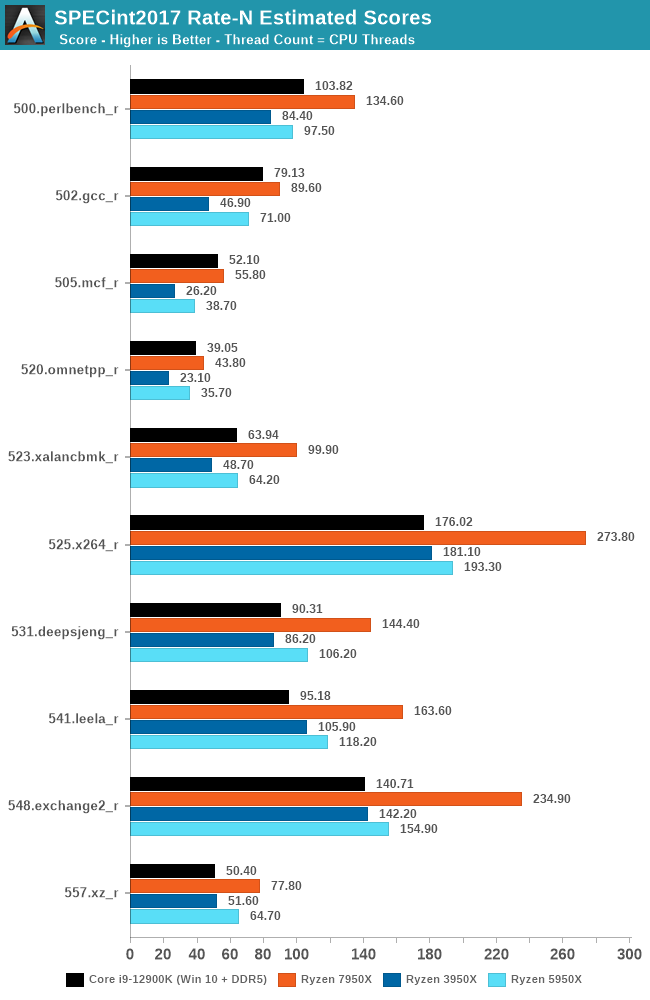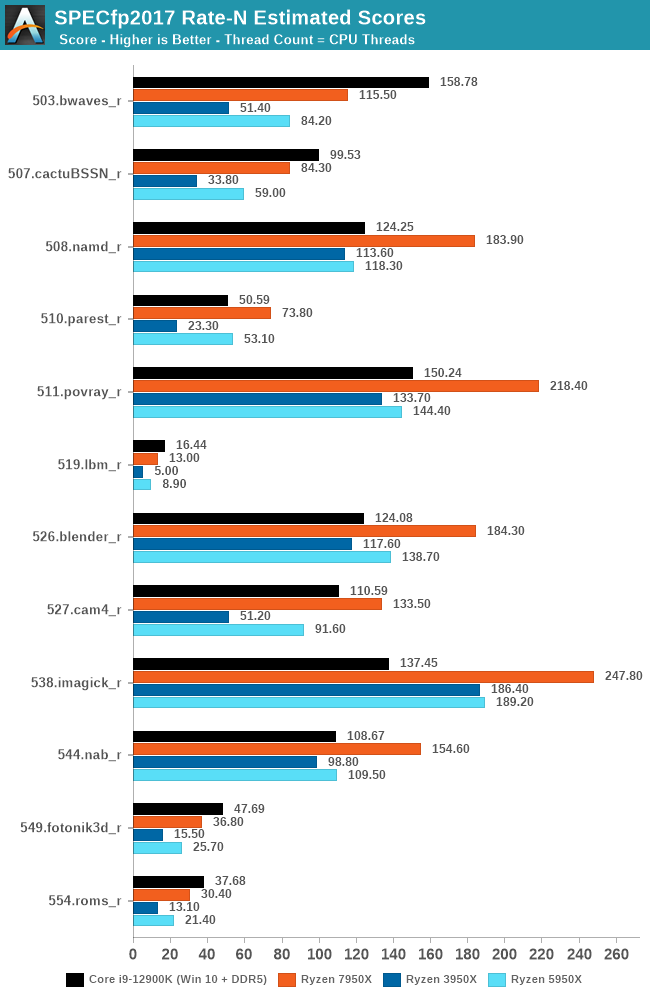AMD Zen 4 Ryzen 9 7950X and Ryzen 5 7600X Review: Retaking The High-End
by Ryan Smith & Gavin Bonshor on September 26, 2022 9:00 AM ESTSPEC2017 Multi-Threaded Results
Although single-threaded performance is important and Zen 4 has a clear advantage here, multi-threaded performance is also very important. Some variables to consider when evaluating multi-threaded performance is that desktop processor designs typically boost a single core higher, with the rest lagging in frequency behind to either stay under the thermal (TJMax) or power (TDP) envelopes. Some manufacturing processes are more efficient by design due to extensive R+D and product management, with Zen 4 looking to be much more in terms of perf per watt over Intel's Alder Lake architecture.
In the instance of the AMD Ryzen 9 7950X, it has a clear advantage over its predecessors in that it not only has a higher single core boost (5.7 GHz versus 4.9 GHz), but it also has a higher TDP than the Ryzen 9 5950X (170 W versus 105 W. This increase in TDP not only allows for a higher frequency, but it allows for a higher frequency spread across all of the cores when under full load.

Opening up our look at our SPECint2017 NT results, and we see a similar uplift in performance gains as we did in the single-threaded tests. In tests such as 500.perlbench_r, the Ryzen 9 7950 is 38% ahead of AMD's previous generation Ryzen 9 5950X, which is impressive. In 523_.xalanbmk_r, the Ryzen 9 7950 is 55% ahead of the Ryzen 9 5950X, and over 100% better in performance over the Zen 2-based Ryzen 9 3950X.

In our SPECfp2017 NT testing, certain workloads such as in 538.imagick_r showed massive increases in performance over previous generations, with a 30% uplift in performance over Zen 3. The difference here between Zen 3 and Zen 2 was marginal (10%), but Zen 4 is a more efficient core architectural design, with many improvements across the board playing a hand here; the switch to DDR5 versus DDR4, more cache per core, higher frequency, higher TDP, etc.
Overall AMD's Zen 4 architectural differences and improvements show that not only does AMD have the crown for single-threaded performance, but it's also ahead in multi-threaded performance too, at least from our SPEC2017 testing. As always when Intel or AMD makes a claim on IPC performance increases, AMD seems to be about right with claims of around 29% in ST performance and even more so in MT performance.










205 Comments
View All Comments
Iketh - Thursday, October 6, 2022 - link
why are you giving so much credit to ddr5? moving to new memory has always given very small gains (if any) in the beginningtjunction is an arbitrary number set by AMD, so using that as an argument is irrational Reply
xol - Tuesday, September 27, 2022 - link
..but my main criticism was of the article - eg phrases like " increase the overall TDP ... without too much penalty" doesn't really make any sense - increase TDP is the penaltyBut much of the article is written as if letting TDP go *much* higher is some sort of gift from AMD -eg the examples I gave
The article is full of nothin-burgers like this statement :
" We feel that the higher all-core frequencies under maximum load, 95°C is a sufficient level of heat for what is on offer when it comes to overall performance" Reply
kwrzesien - Monday, September 26, 2022 - link
Whomever was the last to edit the front page needs to disable the trackpad and clean their mouse ball! 🤣 ReplyThreska - Monday, September 26, 2022 - link
"But now with AMD’s modern RDNA 2 graphics architecture and TSMC fabrication process, AMD has finally seen the (ray traced) light, and is building a small GPU block into the IOD to offer integrated graphics throughout the Ryzen 7000 product stack."I see things like SAM and HSA being a future trend.
https://www.electronicdesign.com/technologies/micr... Reply
erotomania - Wednesday, September 28, 2022 - link
Yes, AMD thought so too, in 2012...https://www.tomshardware.com/reviews/fusion-hsa-op...
and in 2014 here at AT...
https://www.anandtech.com/show/7677/amd-kaveri-rev...
Hopefully this time! Reply
nandnandnand - Monday, September 26, 2022 - link
It seems that going up by 1 GHz didn't help it that much in gaming benchmarks.Meanwhile, the 65W results show that any Zen 4 and later APUs are going to be absurdly powerful. Especially Dragon Range. Reply
Josh128 - Monday, September 26, 2022 - link
Any way you guys can add the single core ECO mode results to the conclusion page or to the R23 results on its respective page? Replydonquixote42 - Monday, September 26, 2022 - link
Single threaded workload would not use more than 65W anyway. So performance should be the same in ECO and non-ECO mode. ReplyJosh128 - Monday, September 26, 2022 - link
Still using a 2080Ti for the games testing is not good. Most certainly many of these results are GPU bound. Replysnowdrop - Monday, September 26, 2022 - link
No power consumption numbers? Will the article be updated with these when they're ready? Reply